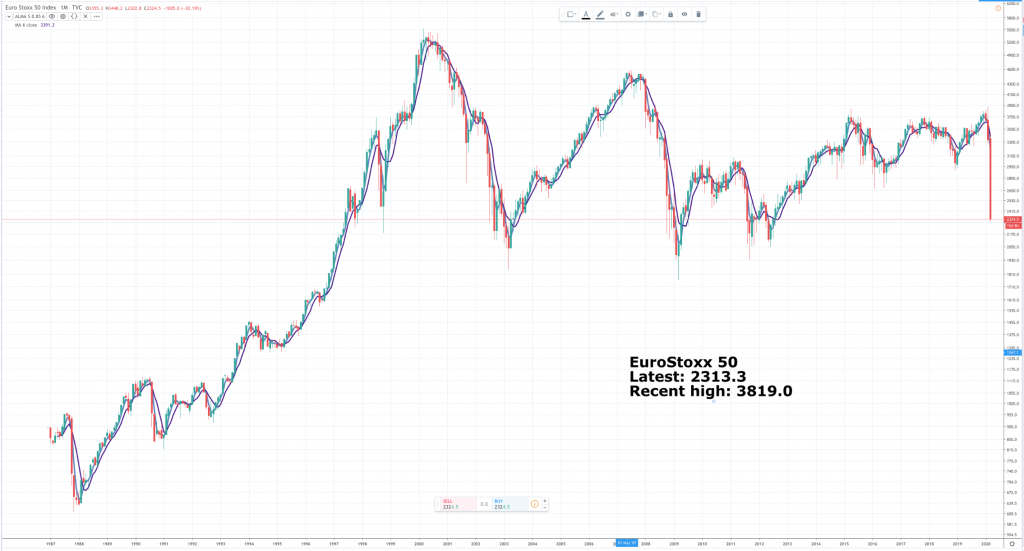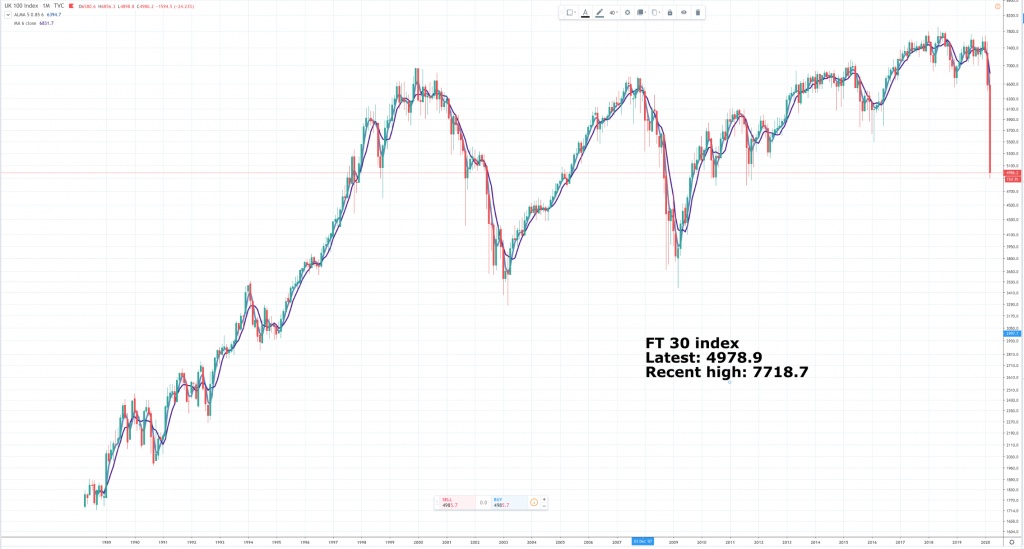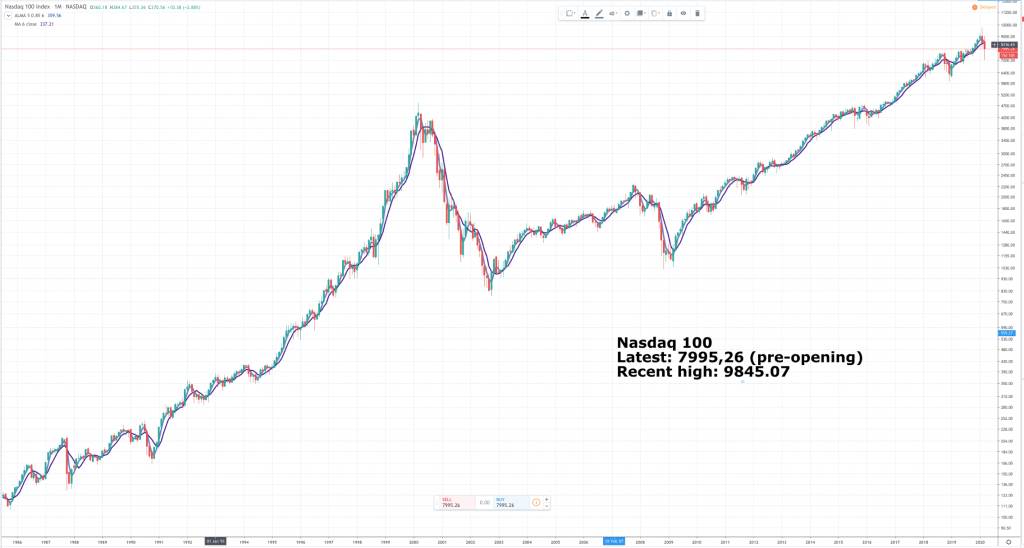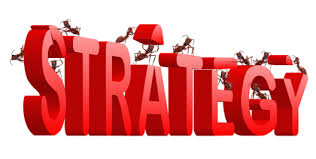



Covid-19 threatens our health and the global economy, which is triggering a stock market meltdown
The charts above of stock market indices for Europe, the UK and the USA confirm two things that all of us already know. Stock markets around the world are suffering dramatic price falls; that’s what’s happening now. The other message is the sustained outperformance of US shares, especially anything to do with technology.
We also have a complete explanation for these two phenomena. The long term divergence between the US and other global stock markets reflects the overwhelming US presence in the dominant trend of our time – the technology revolution, which I believe is (a) at an early stage (b) going to be huge and (c) will ultimately drive the biggest and longest bull market of all time.
But right now something else huge is happening. The world has been hit by a virus which if it had been created as a weapon by some evil Bond-style master villain could hardly be more perfect. It is highly infectious so it spreads rapidly; it is not so infectious that we can do nothing about it and it kills quite a few people so we have to try to contain its spread. So far the only way of doing this seems to involve shutting down the global economy.
It is no wonder stock markets are in free fall. It is hard to imagine anything more devastating for the world economy and corporations. Many businesses are seeing revenue streams not just fall as they might in a recession but disappear completely. Meanwhile they have costs and very often debts that don’t go away. It is a toxic combination that could bankrupt businesses across the globe, triggering knock on effects so even the strongest start to suffer.
Alphabet looks like a rock of stability in an uncertain world with its ad supported search and video streaming businesses. But if companies are struggling to survive and customers are social distancing, self isolating and worried about their own jobs and businesses, ad revenues are going to be affected. This may help explain, why Alphabet shares have lost over 28pc of their value in 18 trading days.
Of course they are still the same great business standing at the heart of the Internet as they have been for years. Almost certainly a year or two from now the shares will again be hitting new all-time peaks but investors are understandably preoccupied with what the next three months could hold. And Alphabet is one of the strongest businesses on the planet with a $121bn cash pile. What about the guys with net borrowings and far less resilient business models.
Stock markets are fearful with good reason. I know what is happening. My Airbnb business has lost £4,000 of bookings in the last four days and that is just for March and April. Amazingly , as I write, my daughter tells me we have just taken a new booking for March, which means we are only down more like £2,000 – woohoo!
Anyhow, I should talk. People like Cineworld, Royal Caribbean, British Airways, Informa (conference organiser) and others are facing the complete collapse of their revenue streams and, as we know, when things get this tough almost nobody is immune, Although I can see why shares in Fisher & Paykel are holding up well. They make devices to help people breathe more freely and the strongest part of their business is supplying hospitals.
I am thinking of this as an incredible stand-off between two mighty forces. In the blue corner the bull market inspired by a technology revolution which, in recent years has been proceeding at an accelerating pace. In the red corner, Covid-19. The blue corner will win in the end but short-term Covid-19 could land some devastating punches.
The $64,000 question is what to do now. I am out. I don’t like to be invested in stock markets or individual stocks, when the moving averages I follow are falling. I also use a lot of leverage so I simply cannot stand a crash. If it is even a threat I have to sell. My impression is that in the long term this is bad for my investment performance but it is the way I operate.
What is surprising given the rapid spread of the virus is that there have been so many strong rallies. I guess what people are thinking is that if short and long term interest rates across the developing world are going to fall to around zero and if governments are going to open the spending floodgates to prove fiscal stimulus at some point that is going to send shares through the roof.
I guess part of what people are worrying about is that (a) shares went into this crisis on historically high valuations and (b) maybe quite a few quoted companies are not going to be around, when happy days return.
There is also the climate of fear created by the virus itself and the associated health risks. I have already self-isolated as far as is practical and my daughter and her family who have returned from Spain to live with us are going to have to share in that isolation. In fact she is staying away for a week to reduce the risks even further.
Given the scale of the double threat it is no surprise that markets are so nervous.
There is also the question mark over how effective government measures on the economy are going to be. No amount of pump priming is going to help airlines, cruise ship and cinema operators until the threat of the virus is removed. History also suggests that if businesses can only survive because they are on life support from the government share holders are usually casualties of war so they get nothing.
The other thing to remember is that company valuations are based on debt and equity added together. A company with £1bn of debt and a £1bn equity market value has a total enterprise value of £2bn. If that halves to £1bn the holders of the debt are at the front of the queue and equity investors get nothing.
This is why in severe bear markets attention quickly switches from the profit and loss statement to the health of the balance sheet. The end game can be that all companies with high levels of debt come under fire and see selling of their shares.
Below I attach the latest editorial which is going out to Chart Breakout subscribers. I don’t have any great answers but it may provide some food for thought.
A secular bull market driven by a technology revolution is fighting a virus stopping the global economy in its tracks; it’s scary
In this issue of Chart Breakout I am not making recommendations; that would be crazy when there are no chart buy signals and we are facing a global pandemic, which is highly infectious, kills some people and where the effort to contain it is threatening to stop the global economy in its tracks.
It is a statement of the blindingly obvious that this crisis could become worse before it becomes better. Shares crashed in 2002-03, when the 2000 investment bubble burst; they crashed again in 2008-09 because of a global financial crisis. Could they crash again because of a global flu pandemic? You have to say it is a possibility.
I have picked charts inside to try to illustrate some of the risks and the opportunities.
There is one category of shares that is in the front line of the global containment efforts and that is anything to do with travel and/ or large gatherings. This includes airlines, cruise ship operators, theme park operators, conference organisers and sports and entertainment related businesses.
The problems become worse if, as is often the case with these types of businesses, there are high fixed costs (ships, planes, theme parks and cinemas). They become worse again if these typically asset rich businesses have used debt to fund the creation of new assets.
Cruise ship operators have been especially affected as it has become apparent that cruise ships are so vulnerable to infectious diseases like Covid-19. A case in point came with Norwegian Cruise Lines, a US-quoted cruise ship operator with 59 cruise ships. They haven’t had any cases on any of their ships but could see which way the wind was blowing. They cancelled all cruises between 13 March and 11 April. As compensation they offered either a 100pc cash refund or 125pc of the value for anyone rebooking a cruise any time up to 2022. The offer made vividly clear that liquidity was likely to become a problem as a result of this decision and the possibility of a longer lasting hiatus in bookings. The already weak shares plummeted along with others in the sector like Royal Caribbean.
There are parallels with what is happening to cruise ship operators and what happened to house building shares in the 2008-09 financial crisis. Shares in the largest UK house builder, Barratt Developments, fell from 854p to 22.8p in 17 months. They were fighting for survival with large debt-funded land banks that suddenly were much less valuable. They survived though and the shares recently reached a new all-time peak just before the virus struck.
Like house builders, cruise ships are great businesses in normal times but first they have to survive. Norwegian Cruise Lines has around $6.5bn of debt; Royal Caribbean has around $12.5bn of debt.
In the UK airlines like British Airways and Virgin have been warning that in the light of President Trump’s ban affecting flights from Europe to the US, they will need government help to survive. These are critical times and not surprisingly shares in IAG (owner of British Airways) have halved in three months. In the circumstances it would take a bold man to want to buy them just now.
The plight of the cinema industry was highlighted by Thursday’s announcement on trading by Cineworld, the world’s second largest operator of cinemas, with more than 1,000 screens. They said trading had been fine but if they faced three months of empty cinemas they would be in danger of breaching their loan covenants. Since they have £3bn of debt and three months of empty cinemas looks a very real possibility the shares have nosedived and are down from 320p in June 2019 to 44p currently, to value the business at £889m.
The problem here is that the enterprise value of Cineworld is debt plus equity so the full value is not £889m but £3.9bn. If that falls to £3bn the debt has priority (that is why equity is risk capital) so the equity value falls to zero.
In the secondary banking crisis back in 1974, which I experienced first hand, many secondary banks were valued at less than the value of the outstanding debt so the equity was worthless. The shares became penny shares, limping along endlessly, priced between 0.5p and 1p. These are shares, which, before the crisis were valued at 300p, 400p or more. Bad stuff can happen.
It never rains but it pours. Cineworld is also being affected on the supply side. Cinema chains make most of their money from a handful of blockbusters, movies like the pending Bond film, No Time to Die’. Because of the virus the release date has been delayed.
One of the pivotal companies in the front line of the Covid-19 outbreak is Walt Disney. Last year Disney generated $26bn, 37 per cent of its total revenue, from 11 theme parks, all of which, as of last week, are now shuttered. Further revenue comes from cruise ships that are no longer taking bookings. Film revenue is obviously going to be affected if nobody is going to the cinema.
Another big earner is ESPN (formerly known as the entertainment and sports programming network). Disney pays a fortune for the rights to sporting events and viewers pay an annual subscription to watch. I have no idea what is going to happen to this business if nobody is going to sporting events including players and sports people. I guess we are going to find out.
Disney has some $40bn of debt. It also has 233,000 employees, many of whom will have nothing productive to do. Somehow they have to keep this show on the road despite a humongous hit to revenue.
I am sure that the Disney board of directors are having urgent meetings and the subject at the top of the agenda will be survival. It would be no surprise if they are in a state of shock. The speed of the virus effects has been so dramatic it is almost as though the planet was hit by a meteorite. The group is currently valued at $221bn ($185bn of equity and the balance debt) after Friday’s dramatic rally but if its survival comes into question the shares are going to stay under pressure. That is one perspective on what is happening but there is another. Disney has a back catalogue to die for and a network both for creating more intellectual property and monetising that IP that is unrivalled. It is deservedly up there with the greatest media companies of all time.
If this company was suddenly available at a fire sale price Warren Buffett, Apple, Netflix, Uncle Tom Cobleigh and all would be waiting to pounce. Especially given that however painful the next few months may prove the pandemic won’t last forever
It may even go away sooner than we think given the success the Asian nations are having in containing the disease and the readiness of nations like Italy, Spain and Iran to take really drastic measures to stop it spreading. Europeans and Americans may be gregarious creatures reluctant to change their habits but they also want to live and avoid damage to their lungs and other vital organs. I, for one, am perfectly ready to stay at home and wash my hands 50 times a day if that will help.
The bottom line is that it is very hard to value Disney shares in current conditions. On the one hand it is hard to see how they could survive a prolonged virus-inspired shutdown of so many of their businesses. On the other hand it seems ridiculous for the value of the group to collapse because of a set of circumstances which, however devastating, are temporary.
In reflection of this the shares have crashed from a peak above $154 in December to a recent low point of $91 but on Friday they rallied sharply to close at $102.50. They seem likely to remain volatile like the stock market generally, which in many respects faces similar issues to Disney, albeit not with quite such directness.
I have also included charts of the big four – the four horsemen of the Internet if you like – Apple, Alphabet, Amazon and Microsoft. These are four of the greatest businesses the world has ever seen. They should surely be able to ride the storm and come out stronger than ever at the other end.
Nevertheless crisis conditions have a way of finding weaknesses. If Amazon has a weakness it is that it needs to invest at a ferocious rate to grow and it needs to grow to justify its share price, which is very much priced for growth.
A bit like Disney we can see that Amazon is a collection of fabulous businesses, Amazon Marketplace (the retail operations), Amazon Prime (the subscription and video streaming business) and Amazon Web Services (the world’s largest cloud computing support services business).
The question people may start to ask is exactly how does Amazon fund its growth. It makes heavy use of lease finance, which is recognised in the accounts. However a group called ‘The Footnotes Analyst’ looked at Amazon’s figures for 2018. The most widely used measure showed free cash flow for the group of $19bn. After TFA had finished doing their calculations the revised figure was minus $3.4bn.
None of this matters in good times and it doesn’t change the fact that Amazon is a fabulous collection of businesses but it does show how sentiment could alter if tough trading conditions persist. The chart is finely poised with the shares trading around the middle of a two year trading range. If they broke down this could be catastrophic for the company and probably the whole stock market. They recently appeared to be breaking higher, when they closed above $2100 but this now looks like a false alarm, maybe even a bull trap, the name for a chart pattern that looks like a bullish breakout but quickly reverses.
An interesting category of shares in a crash is index-tracking ETFs. An ETF with the code QQQ tracks the Nasdaq 100 index. As you can imagine it has taken a beating recently. It peaked on 19 February at 237.3. Since then it has been as low as 176.93 (a fall of 25.5pc in a month!) and is currently 192.34 after a sharp rally.
The rally has been driven by the impression that the authorities are going to throw everything plus the kitchen sink at the global economy to try to avert a global recession. Already low interest rates are falling further and there is talk of big fiscal stimulus if monetary policy doesn’t work.
This has given a pattern to the decline. Bad news on the virus, shares plummet, good news on reflation plans, sharp rally but overall share prices are tacking lower with the moving averages rolling over and starting to point down.
The moving averages I use are a five month momentum average and a six month conventional moving average. If both are pointing down for a share or an index I would not want to be invested.
My logic is not so much that falling averages predict more weakness ahead; sometimes they do and sometimes they don’t. What I am more influenced by is that if a share or index is going to fall a long way then it will start with the moving averages falling. For example, in the case of Cineworld, the moving averages were confirmed as heading lower when the shares were 256p, which looks a very good price now that the shares are 44p.
In the case of Disney the moving averages are falling and gave a confirmed sell signal when the price was around $120.
In the case of QQQ the moving averages have yet to cross, so swift has been the reversal but the uptrend line has been broken and with one moving average already falling we are firmly into consolidation territory. The implication is that the index needs to continue to rally strongly from here to prevent both moving averages from falling.
Moving averages work well for big moves. They are less useful, when shares are bumping around. However we have the perfect conditions for big moves. If the authorities fail to control the pandemic a big fall in prices is likely with shares in cruise lines and cinema operators acting like the canaries in the mine warning of trouble ahead. If the pandemic comes under control, as seems to be happening in Asia, then we will be back to the big technology bull market and can expect shares to resume their climb led by the Nasdaq 100.
The two ETFs I have charted are QQQ3 and SOXL. These two multiply index moves by three fold so they turn dramatic moves into incredibly dramatic moves. QQQ3 is three times QQQ, aka the Nasdaq 100 index. You can imagine what has been happening to this ETF. It peaked at 2580 in February and is currently 1022.54, having been as low as 1000.79. If you look at the long term chart this ETF, like the underlying index, always recovers. It is just that while it is falling you have no idea how low it is going to go. This makes it tempting either to have a regular buying programme, adding a few every month or just buy a few every time the market has a massive down day. You should win in the end and eventually make a killing.
The same can be said of SOXL, which tracks the Philadelphia Semiconductor index, albeit that because it is rebalanced daily, its long term performance may diverge somewhat from that of the index and again multiplies it by three. Semiconductors stand at the heart of the technology revolution so shares in semiconductor companies tend to be great, albeit volatile, performers.
As a result SOXL, a three times leveraged ETF tracking already volatile shares, is almost unbelievably volatile. Last Friday, the shares rallied 27.3pc in a day. Despite this they are still down 60.8pc since 14 February. Even allowing for that though they are still up 16-fold since November 2014. If you want action SOXL is at the Formula One end of stock market performance.
And this makes them an interesting candidate for the same regular averaging/ buying on massive down days strategy I suggested for QQQ3. It is not easy to do temperamentally because you could easily buy them, say this week and a week later find you have made a paper loss of half your investment. However if you can stick with it, keep buying and saying those Hail Marys, you could eventually, when Covid-19 has disappeared into the history books, find you have a valuable holding acquired at very low prices.
The attraction of starting now or in the next bumpy period for shares, is that like QQQ3 they are already well down from the peak. Make the reasonable supposition that the ongoing technology revolution will take these ETFs to new all-time peaks again one day and that looks like an attractive strategy.
Plus you don’t have to get it right on the share picking because ETFs are regularly rebalanced around the winners so if new stars emerge and others fall from grace that will be reflected in the composition of their portfolios.
This bear market will end like all others although unfortunately nobody rings a bell when that happens. What we will see though is great buy signals from my moving averages as they start to cross on the way up (golden crosses as they are known to chartists). Before then though survival is the name of the game, which either means putting your portfolio in a metaphorical bottom drawer and sitting it out until the good times return or coming out like me and waiting for the buy signals that will eventually start coming.
Warren Buffett is richer than me, to put it mildly and he always sits it out. There may be a message there.

I have really said everything above. I don’t have a crystal ball. There are really three options. Sit tight like Warren Buffett, go liquid and wait for better times like me or mix and match those strategies. Business owners like Jeff Bezos and a host of other tech entrepreneurs don’t sell when times get tough; they just don’t think like that and they usually accumulate the biggest fortunes of all in the end so I think a bias to hanging in there is certainly justifiable but only if you can sleep at night.



